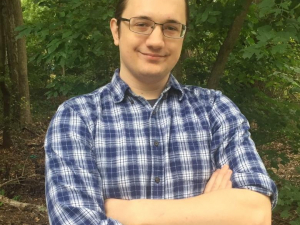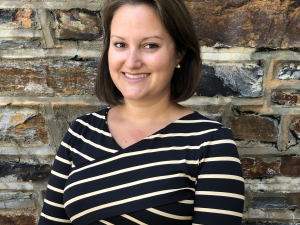Sociology Alumni Share Their Experiences With Current Students

“Duke Sociology has been training excellence for a long time,” said Jen’nan Read, Sally Dalton Robinson Professor and chair of the Department of Sociology.
Both the quality of Duke’s graduate Sociology program and the longevity of its success were evident on March 22, when three alumni returned to campus for a panel discussion with current and prospective graduate students. The event was sponsored by the Sociology department’s Jensen Speaker Series and by the Duke Centennial, in celebration of the 100th anniversary of the university.
Although Emily Agree (Ph.D. 1993), Sarah Mustillo (Ph.D. 2001) and Joshua Fink (Ph.D. 2017) earned their degrees in different decades and offered unique perspectives on their very different career paths, all credited their experiences at Duke to contributing immeasurably to their success.
Agree is a research professor at Johns Hopkins University and Associate Director of the Hopkins Population Center. Mustillo is a professor of Sociology and Dean of the College of Arts and Letters at the University of Notre Dame. Fink works in the NBA as Senior Director of Data Science for the San Antonio Spurs. He also teaches sports analytics at the McCombs School of Business, University of Texas at Austin.
“These three speakers represent the diversity of what sociologists do in real life,” said Read.
The Duke Sociology department has existed for more than 75 years and its graduate program is currently ranked #13 by U.S. News and World Report. Among its many strengths is a strong reputation in medical sociology, which attracted Mustillo to the program. She had planned to go to medical school, but changed her mind after seeing the opportunities medical sociology offered and visiting Duke. She was impressed by how supportive the environment of the graduate program was. “My cohort was very tight,” she remembered. “A big part of my decision to come to Duke was the culture. I became part of a network of people I’ll have access to forever. I don’t think that happens at every school.”
Emily Agree “fell in love with research” at Duke. By the 1990’s, the Sociology department had a strong reputation in the study of aging, thanks in large part to the pioneering work of Professor George C. Myers. Agree was set on a path that eventually led to her serving on the steering committee of the National Health and Aging Trends Study, one of the most important longitudinal studies that gathers data on daily life as we grow older.
Fink also credits Duke’s graduate Sociology program with providing valuable training in quantitative data collection and analysis, which ultimately led to his current career with the NBA. The Ph.D. program was supportive of his interests in advanced quantitative methods, allowing him to earn a master’s degree in Statistics while working on his Ph.D.
“I started a sports blog while I was in grad school,” he said. “It was just for fun. I used data to analyze which drafts would be successful on a team and which wouldn’t.” His blog caught the attention of the San Antonio Spurs, and he was recruited to work with the team as soon as he finished his degree. “The quantitative measures you learn in a Sociology graduate program matter to businesses,” he observed.
Agree encouraged the students in the audience not to be single-minded in their graduate careers. “You can have a wide variety of interests,” she said. “I teach a lot of pre-med students at Hopkins. They come into my class thinking they know what Sociology is, but they learn there’s so much more to it.”
Drawing on the success of this event, the Department of Sociology plans to hold a follow-up panel with undergraduate alumni in Fall 2024, also sponsored by the Duke Centennial.




